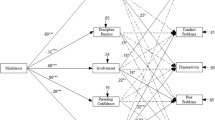Abstract
This study evaluated the impact of maternal mood on mother-son interaction patterns. Forty boys between the ages of 46 and 72 months and their mothers participated. A within-subject experimental design was employed so that all mothers participated in both a positive and a negative mood induction. Observations of mother-son interactions were conducted immediately following the mood inductions. During the negative mood condition, mothers issued fewer positive statements toward their children and engaged in less general verbal interaction. In addition, children were less compliant with maternal commands during the negative mood condition. Implications of the effects of mood on mother-child interaction patterns are discussed.
Similar content being viewed by others
References
Belsky, J. (1981). Early human experience: A family perspective.Developmental Psychology, 17, 3–23.
Belsky, J. (1984). The determinants of parenting: A process model.Child Development, 55, 83–96.
Blaney, P. H. (1986). Affect and memory: A review.Psychological Bulletin, 99, 229–246.
Bower, G. H. (1981). Mood and memory.American Psychologist, 36, 129–148.
Clark, D. M. (1983). On the induction of depressed mood in the laboratory: Evaluation and comparison of the Veiten and Musical procedures.Advances in Behaviour Research and Therapy, 5, 27–49.
Cohn, J. F., & Tronick, E. Z. (1983). Three-month-old infants' reaction to simulated maternal depression.Child Development, 54, 185–193.
Coyne, J. C. (1976). Depression and the response of others.Journal of Abnormal Psychology, 85, 186–193.
DeMonbreun, B. G., & Craighead, W. E. (1977). Distortion of perception and recall of positive and neutral feedback in depression.Cognitive Therapy and Research, 1, 311–329.
Dumas, J. E. (1986). Indirect influence of maternal social contacts on mother-child interactions: A setting event analysis.Journal of Abnormal Child Psychology, 14, 205–216.
Forehand, R., Lautenschlager, G. J., Faust, J., & Graziano, W. G. (1986). Parent perceptions and parent child interactions in clinic-referred children: A preliminary investigation of the effects of maternal depressive moods.Behaviour Research and Therapy, 24, 73–75.
Forehand, R., McCombs, A., & Brody, G. H. (1987). The relationship between parental depressive mood states and child functioning.Advances in Behaviour Research and Therapy, 9, 1–20.
Forest, D., Clark, M. S., Mills, J., & Isen, A. M. (1979). Helping as a function of feeling state and nature of the helping behavior.Motivation and Emotion, 3, 161–169.
Hops, H., Biglan, A., Sherman, L., Arthur, J., Friedman, L., & Osteen, V. (1987). Home observations of family interactions of depressed women.Journal of Consulting and Clinical Psychology, 55, 341–346.
Ingram, R. E., Smith, T. W., & Brehm, S. S. (1983). Depression and information processing: Self-schemata and the encoding of self-referent information.Journal of Personality and Social Psychology, 45, 412–420.
Kantor, J. R. (1959).Interbehavioral psychology. Granville, OH: Principia Press.
Lahey, B. B., Conger, R., Atkeson, B. M., & Treiber, F. A. (1984). Parenting behavior and emotional status of physically abusive mothers.Journal of Consulting and Clinical Psychology, 36, 252–256.
Lyons-Ruth, K., Zoll, D., Connell, D., & Grunebaum, H. U. (1986). The depressed mother and her one-year-old infant: Environment, interaction, attachment, and infant development. In E. Z. Tronick & T. Field (Eds.),Maternal depression and infant disturbance (pp. 61–82). San Francisco: Jossey-Bass.
Mills, M., Puckering, C., Pound, A., & Cox, A. (1985). What is it about depressed mothers that influences their children's functioning? In J. E. Stevenson (Ed.),Recent research in developmental psychopathology, Oxford: Pergamon Press.
Panaccione, V. F., & Wahler, R. G. (1986). Child behavior, maternal depression, and social coercion as factors in the quality of child care.Journal of Abnormal Child Psychology, 14, 263–278.
Parke, R. D., & Tinsley, B. J. (1987). Family interaction in infancy. In J. D. Osofsky (ed.),Handbook of infant development (2nd ed., pp. 579–641). New York: Wiley.
Patterson, G. R. (1982).Coercive family process. Eugene, OR: Castalia.
Radke-Yarrow, M., Cummings, E. M., Kuczynski, L., & Chapman, M. (1985). Patterns of attachment in two- and three-year-olds in normal families and families with parental depression.Child Development, 56, 884–893.
Rehm, L. P. (1977). A self-control model of depression.Behavior Therapy, 8, 787–804.
Rehm, L. P., & Naus, M. J. (1988, May).A memory model of emotion. Paper presented at Contemporary Psychological Approaches to Depression: Treatment, Research, and Theory, San Diego, CA.
Roth, D., & Rehm, L. P. (1980). Relationships among self-monitoring processes, memory, and depression.Cognitive Therapy and Research, 4, 149–159.
Sameroff, A. J., Seifer, R., & Zax, M. (1982). Early development of children at risk for emotional disorder.Monographs of the Society for Research in Child Development, 47, (Serial No. 199).
Schaughency, E. A., & Lahey, B. B. (1985). Mothers' and fathers' perceptions of child deviance: Roles of child behavior, parental depression, and marital satisfaction.Journal of Consulting and Clinical Psychology, 53, 718–723.
Stephens, R. S., Hokanson, J. E., & Welker, R. (1987). Responses to depressed interpersonal behavior: Mixed reactions in a helping role.Journal of Personality and Social Psychology, 52, 1274–1282.
Sutherland, G., Newman, B., & Rachman, S. (1982). Experimental investigations of the relations between mood and intrusive, unwanted cognitions.British Journal of Medical Psychology, 55, 127–138.
Wahler, R. G. (1980). The insular mother: Her problems in parent-child treatment.Journal of Applied Behavior Analysis, 13, 207–219.
Wahler, R. G., & Fox, J. J. (1981). Setting events in applied behavior analysis: Toward a conceptual and methodological expansion.Journal of Applied Behavior Analysis, 14, 327–338.
Zahn-Waxler, C., Cummings, M., McKnew, D. H., & Radke-Yarrow, M. (1984). Altruism, aggression, and social interactions in young children with a manic depressive parent.Child Development, 55, 112–122.
Zekoski, E. M., O'Hara, M. W., & Wills, K. E. (1987). The effects of maternal mood on motherinfant interaction.Journal of Abnormal Child Psychology, 15, 361–378.
Zuckerman, M., & Lubin, B. (1965).Manual for the Mutiple Affect Adjective Checklist. San Diego, CA: Educational and Industrial Testing Service.
Author information
Authors and Affiliations
Additional information
The authors wish to thank Linda Pfiffner, Susan O'Leary, Everett Waters, Joanne Wood, Norman Goodman, Annette Farris, Diadre Wilbourne, Vicki Endris, David Celiberti, and Thomas Power for their assistance in the completion of this project.
Rights and permissions
About this article
Cite this article
Jouriles, E.N., Murphy, C.M. & O'Leary, K.D. Effects of maternal mood on mother-son interaction patterns. J Abnorm Child Psychol 17, 513–525 (1989). https://doi.org/10.1007/BF00916510
Revised:
Issue Date:
DOI: https://doi.org/10.1007/BF00916510




